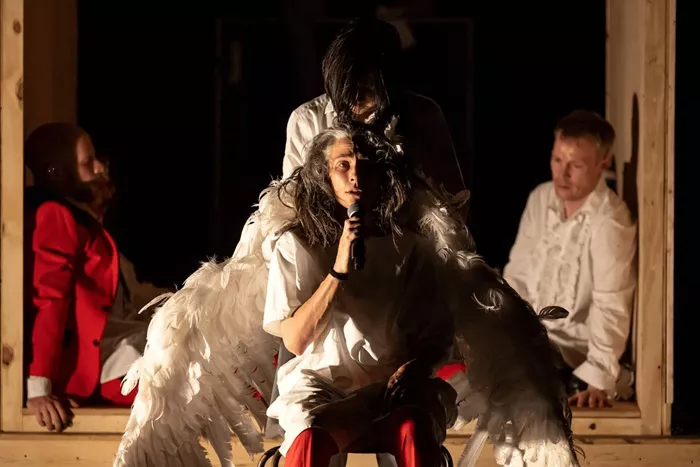Welcome to Poem of the Day – To Nobodaddy by William Blake.
William Blake, a seminal figure in British poetry, is renowned for his intricate symbolism, visionary themes, and profound engagement with spiritual and societal questions. To Nobodaddy is one of his more enigmatic poems, appearing in his collection Songs of Experience (1794). As a critical part of Blake’s broader exploration of innocence and experience, the poem critiques the concept of a distant and indifferent deity, which Blake often regarded as the antithesis of genuine spirituality.
To Nobodaddy Poem
Why art thou silent & invisible
Father of jealousy
Why dost thou hide thyself in clouds
From every searching Eye
Why darkness & obscurity
In all thy words & laws
That none dare eat the fruit but from
The wily serpents jaws
Or is it because Secrecy
gains females loud applause
To Nobodaddy Poem Explanation
To Nobodaddy presents a sharp, satirical attack on the traditional Christian conception of God, whom Blake refers to as “Nobodaddy.” In this poem, Blake critiques the authoritarian figure of God, who, in Blake’s eyes, serves as a tyrant, demanding blind obedience while offering no real connection or personal engagement with human beings. The poem’s stark language and accusatory tone reveal Blake’s dissatisfaction with conventional religious doctrine. By examining the poem’s key themes, structure, and symbolism, we can gain insight into Blake’s larger views on spirituality and his rejection of an impersonal, punitive deity.
The Title: “Nobodaddy” as a Symbol
The title To Nobodaddy immediately introduces a satirical, almost mocking tone. The term “Nobodaddy” is a play on the word “nobody,” but it carries with it a deeper critique of the religious figure that Blake saw as a patriarchal and omnipotent figurehead. The word “Daddy” introduces a paternal dimension, indicating that this deity is not a nurturing or loving father, but rather a neglectful and domineering figure. By using the term “Nobodaddy,” Blake implies that the god of conventional Christianity is not a true father figure at all but a non-entity, an empty symbol of authority with no real substance or affection.
This characterization of God as “Nobodaddy” is a sharp contrast to the personal, loving relationship with the divine that Blake advocated. For Blake, God should be a figure of compassion and joy, not a distant and arbitrary force demanding punishment and suffering.
The Poem’s Structure and Tone
Blake’s use of simple, direct language in To Nobodaddy enhances the bitter, mocking tone of the poem. The poem’s structure—brief and forceful—reflects the urgency and intensity of the poet’s rejection of traditional religious ideals. The rhythmic cadence of the poem contrasts with its sharp content, lending an ironic twist to its otherwise bitter critique.
Blake’s decision to keep the poem concise also suggests that the critique of religion is not something to be overstated but rather an inescapable and straightforward truth. The structure serves to reinforce the sense of frustration with a god who demands obedience but offers no emotional or spiritual engagement in return.
The Critique of Authority and Spirituality
Blake’s To Nobodaddy goes beyond mere criticism of religion; it is a critique of any authoritarian figure who claims to have the moral and spiritual authority over others. The figure of “Nobodaddy” represents not just the God of organized religion but any tyrant who imposes power without offering love, understanding, or compassion. The poem embodies Blake’s deeper philosophical conviction that true spirituality is a personal, intimate experience between the individual and the divine, far removed from the impersonal, law-based structures of traditional religion.
Blake’s rejection of such authoritarian religious figures was grounded in his belief that they stifled the human spirit and hindered true personal expression and growth. As a British poet who was deeply engaged with the political and social issues of his time, Blake saw these religious authorities as part of a larger system of control, a force that manipulated people into submission under the guise of divine will.
Conclusion
In To Nobodaddy, William Blake delivers a poignant and critical commentary on the nature of God, spirituality, and authority. By satirizing the concept of God as an uncaring tyrant, Blake calls for a return to a more personal, direct, and compassionate understanding of the divine. The poem stands as a testament to Blake’s broader critique of societal and religious institutions, advocating instead for a vision of spirituality rooted in love, individuality, and freedom from oppressive control. As a notable example of British poetry, it highlights Blake’s ongoing concern with the ways in which spiritual and social forces intersect, and the importance of questioning authority in the search for personal and collective liberation.

